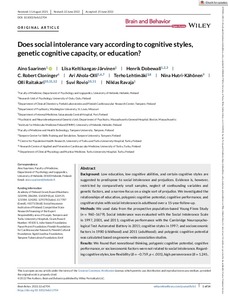Does social intolerance vary according to cognitive styles, genetic cognitive capacity, or education?
Saarinen Aino; Keltikangas-Järvinen Liisa; Dobewall Henrik; Cloninger Robert C; Ahola-Olli Ari; Lehtimäki Terho; Hutri-Kähönen Nina; Raitakari Olli; Rovio Suvi; Ravaja Niklas
https://urn.fi/URN:NBN:fi-fe2022102463196
Tiivistelmä
Background
Low education, low cognitive abilities, and certain cognitive styles are suggested to predispose to social intolerance and prejudices. Evidence is, however, restricted by comparatively small samples, neglect of confounding variables and genetic factors, and a narrow focus on a single sort of prejudice. We investigated the relationships of education, polygenic cognitive potential, cognitive performance, and cognitive styles with social intolerance in adulthood over a 15-year follow-up.
Methods
We used data from the prospective population-based Young Finns Study (n = 960‒1679). Social intolerance was evaluated with the Social Intolerance Scale in 1997, 2001, and 2011; cognitive performance with the Cambridge Neuropsychological Test Automated Battery in 2011; cognitive styles in 1997; and socioeconomic factors in 1980 (childhood) and 2011 (adulthood); and polygenic cognitive potential was calculated based on genome-wide association studies.
Results
We found that nonrational thinking, polygenic cognitive potential, cognitive performance, or socioeconomic factors were not related to social intolerance. Regarding cognitive styles, low flexibility (B = –0.759, p < .001), high perseverance (B = 1.245, p < .001), and low persistence (B = –0.329, p < .001) predicted higher social intolerance consistently in the analyses.
Discussion
When developing prejudice-reduction interventions, it should be considered that educational level or cognitive performance may not be crucial for development of social intolerance. Adopting certain cognitive styles may play more important roles in development of social intolerance.
Kokoelmat
- Rinnakkaistallenteet [27094]
